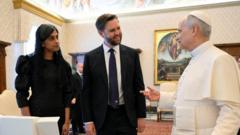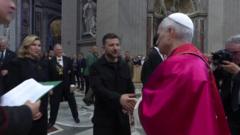Pope Leo XIV, during his first Mass, underscored the need for the Catholic Church to connect with "ordinary people," addressing societal issues and highlighting the role of faith in combating human dignity violations.
Pope Leo XIV's First Mass: Bridging Faith and the Marginalized

Pope Leo XIV's First Mass: Bridging Faith and the Marginalized
In his inaugural Mass, the newly elected Pope Leo XIV emphasizes "missionary outreach" and the importance of supporting ordinary people amid societal challenges.
The new pontiff's message signifies a potential shift towards a more mission-driven Church, reminiscent of his predecessor, Pope Francis.
---
As Pope Leo XIV marked his first Mass as the pontiff of 1.4 billion Catholics on May 9, 2025, at the Sistine Chapel, he expressed a heartfelt commitment to support "ordinary people" amid the challenges facing society. His call for "missionary outreach" resonated with the cardinals present, reinforcing the urgency to heal the “wounds that afflict our society.”
In a homily infused with theological depth, the Chicago-born Pope, formerly known as Cardinal Robert Francis Prevost, emphasized the secular concerns challenging faith across the globe. Reflecting on his predecessor Pope Francis' teachings, Leo XIV acknowledged that a decline in religious conviction has contributed to "appalling violations of human dignity" and increased societal disarray.
Highlighting that the Church needs to become a voice for the marginalized, he stressed the importance of preaching in environments where believers face ridicule, saying these “contexts” require a robust missionary approach. Leo's stance was particularly meaningful, coming from the world’s richest nation, as he portrayed a clear affinity for the less privileged.
Access to resources, the fight for dignity, and the need for faith in an increasingly skeptical society were central themes during his address. Leo XIV’s view of Jesus as a figure who championed the disadvantaged echoed through his message, showing a connection to early Christian narratives. He reflected on how the perception of Christianity has changed, often seen as “absurd” or a belief for the weak.
Leo XIV's advocacy for the poor is rooted in his extensive missionary efforts, particularly during two decades serving in Peru, where he garnered experiences that shaped his pastoral vision. This cultural richness and diverse background solidified his role as a unifying figure for both American and Latin American Catholics.
Moving forward, the new pope faces the critical challenge of defining the Church’s future direction amid ideological divides concerning key issues like the role of women, LGBTQ+ acceptance, and responses to clerical abuse scandals. However, his emphasis on humility and service promises a renewed focus on the Church’s commitment to its followers, encouraging cardinals and clergy to live as "simple missionaries" rather than as figures of authority.
Pope Leo XIV’s election and his inaugural message herald a transformative chapter for the Catholic Church, aiming to reclaim its space among society’s most pressing dilemmas while asserting its mission to serve and uplift ordinary people across the globe.
---
As Pope Leo XIV marked his first Mass as the pontiff of 1.4 billion Catholics on May 9, 2025, at the Sistine Chapel, he expressed a heartfelt commitment to support "ordinary people" amid the challenges facing society. His call for "missionary outreach" resonated with the cardinals present, reinforcing the urgency to heal the “wounds that afflict our society.”
In a homily infused with theological depth, the Chicago-born Pope, formerly known as Cardinal Robert Francis Prevost, emphasized the secular concerns challenging faith across the globe. Reflecting on his predecessor Pope Francis' teachings, Leo XIV acknowledged that a decline in religious conviction has contributed to "appalling violations of human dignity" and increased societal disarray.
Highlighting that the Church needs to become a voice for the marginalized, he stressed the importance of preaching in environments where believers face ridicule, saying these “contexts” require a robust missionary approach. Leo's stance was particularly meaningful, coming from the world’s richest nation, as he portrayed a clear affinity for the less privileged.
Access to resources, the fight for dignity, and the need for faith in an increasingly skeptical society were central themes during his address. Leo XIV’s view of Jesus as a figure who championed the disadvantaged echoed through his message, showing a connection to early Christian narratives. He reflected on how the perception of Christianity has changed, often seen as “absurd” or a belief for the weak.
Leo XIV's advocacy for the poor is rooted in his extensive missionary efforts, particularly during two decades serving in Peru, where he garnered experiences that shaped his pastoral vision. This cultural richness and diverse background solidified his role as a unifying figure for both American and Latin American Catholics.
Moving forward, the new pope faces the critical challenge of defining the Church’s future direction amid ideological divides concerning key issues like the role of women, LGBTQ+ acceptance, and responses to clerical abuse scandals. However, his emphasis on humility and service promises a renewed focus on the Church’s commitment to its followers, encouraging cardinals and clergy to live as "simple missionaries" rather than as figures of authority.
Pope Leo XIV’s election and his inaugural message herald a transformative chapter for the Catholic Church, aiming to reclaim its space among society’s most pressing dilemmas while asserting its mission to serve and uplift ordinary people across the globe.



















